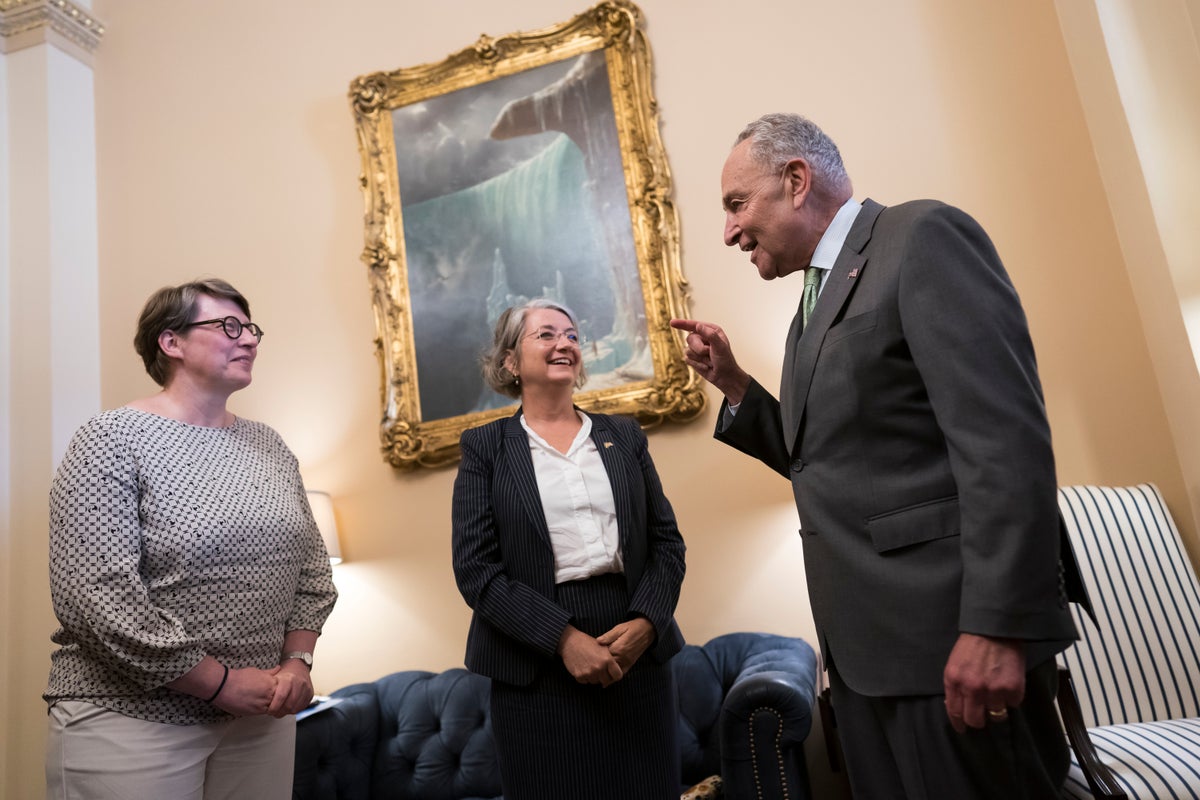
The US Senate on Wednesday voted overwhelmingly to give its’ assent to making Finland and Sweden the 31st and 32nd members of the North Atlantic Treaty Organisation, just under three months after President Joe Biden recommended that both nations be allowed to join the 73-year-old defensive alliance.
In a statement, Mr Biden called the vote “historic” and said it “sends an important signal of the sustained, bipartisan U.S. commitment to Nato”.
“I thank the members of the Senate – especially Majority Leader Schumer, Minority Leader McConnell, Senator Menendez and Senator Risch -- for their leadership and for quickly advancing the ratification process, the fastest Senate process for a NATO protocol since 198,” he said. “Finland and Sweden joining the Alliance will further strengthen Nato’s collective security and deepen the transatlantic partnership”.
The vast majority of senators — 48 Democrats and 48 Republicans — voted in favour of both nations’ accession to Nato, easily overcoming the two-thirds (67 votes) majority required to ratify the instrument giving American support to the two potential Nato members. Each of the 30 current member nations must unanimously agree before any new countries can join the alliance.
Just a single Republican, Senator Josh Hawley of Missouri voted against the expansion. Mr Hawley had previously announced that he would oppose allowing Finland and Sweden to join Nato because the US would be obligated to defend them from attack under Article V of the North Atlantic Treaty. Nato members have only invoked Article V just once before: in 2001, after the September 11 terrorist attacks on New York and Washington.
Two Democrats, Senator Patrick Leahy and Senator Jeff Merkley, did not vote, while another Republican, Senator Rand Paul of Kentucky, voted “present”.
Senators also rejected an amendment offered by Mr Paul to add a reservation to the accession protocols stating that the US would only fulfill its’ Article V mutual defence obligations upon passage of a declaration of war by Congress.
Only 10 senators — Mr Paul and Mr Hawley, plus Senators Mike Braun of Indiana, Ted Cruz of Texas, Steve Daines of Montana, James Lankford of Oklahoma, Mike Lee of Utah, Cynthia Lummis of Mississippi, Roger Marshall of Kansas, and Wisconsin Senator Ron Johnson — voted in favour of the amendment. Mr Paul has long opposed expanding Nato and voted against ratifying accession protocols for the last two countries to join the alliance, Montenegro and North Macedonia after a similar amendment was rejected.
Mr Paul and many of the other senators who opposed the accession protocol have repeatedly warned against Nato expansion in response to Russia’s unprovoked invasion of Ukraine, and against offering defence assistance to Ukraine.
The ratification of the accession protocols brings both Finland and Sweden a step closer to formally joining the alliance and ending decades of neutrality.
In May, President Joe Biden appeared with both Finnish President Sauli Niinistö and Swedish Prime Minister Magdalena Andersson to offer the “strong support of the United States” for both countries’ applications to join Nato.
“Sweden and Finland have strong democratic institutions, strong militaries, strong and transparent economies, and a strong moral sense of what is right,” Mr Biden said, adding that both nations “meet every Nato requirement, and then some”.
Senator Lindsey Graham, a longtime foreign policy hawk, credited Russia’s invasion with providing Nato with its’ two newest members.
“There's one person that I want to thank … President Putin of Russia,” Mr Graham said. “Without you, we wouldn't be here. You've done more to strengthen Nato than any speech I could ever hope to give”.
Mr Graham said the alliance “has been the strongest force for good … on the planet since 1949,” and said the additions of Finland and Sweden would make it stronger than it was before Mr Putin ordered Russian forces to attack Ukraine.
The South Carolina Republican also hit out at colleagues who suggested allowing new Nato members to join the alliance would make it harder for the US to focus on threats from China.
He asked: “How can you believe for one moment, abandoning Ukraine or showing less of a commitment to European stability will make China more afraid of us and less likely to invade Taiwan?”
“The best thing we can do right now as a world, particularly the democratic world, is to become stronger in the face of aggression,” he said.







